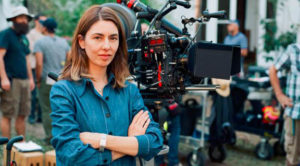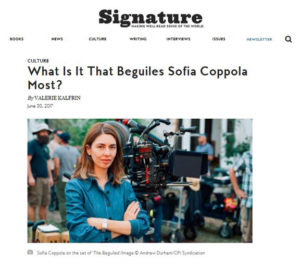
Sofia Coppola on the set of “The Beguiled”/Image © Andrew Durham/CPi Syndication
By Valerie Kalfrin
Signature Reads, June 30, 2017
Few things beguile Sofia Coppola more than the female mind. Her films’ meticulous detail and deliberate pacing make us curious like the boys who loved the unobtainable Lisbon sisters in her feature-film debut, “The Virgin Suicides,” based on the novel by Jeffrey Eugenides. She’s compassionate toward her characters but shrouds them in mystery, with a remove that’s almost anthropological – and ironic, considering the intimacy of her gaze.
A Coppola film unfolds in long, languid shots, encouraging our patience and attuning us to clues in her tableaus of transition. Whether she’s trained her eye on five blonde teens in the 1970s, a young wife meandering through Tokyo, or a French monarch cocooned in extravagance, she offers some insights as to what makes them tick but not all, the result more like a fever dream than a resolution tied with a bow.
She returns to this landscape again in “The Beguiled,” after detours into male movie star ennui (2010’s “Somewhere” and 2015’s “A Very Murray Christmas,” which reteamed her with her idol, Bill Murray). “The Beguiled” looks at what happens to the headmistress (Nicole Kidman), teacher (Kirsten Dunst), and students (including Elle Fanning) cloistered at a Civil War-era boarding school when a wounded Union soldier (Colin Farrell) lands in their midst. It’s an adaptation of Thomas Cullinan’s 1966 Southern gothic novel, which inspired Don Siegel’s 1971 film starring Clint Eastwood and Geraldine Page. Both the book and earlier film are pulpy in imagining how this man gets the female characters hot and bothered.
Coppola flipped the script. “My intention was to give the women a voice and make it about them,” she told Film Journal. “So much of [the story] is about their desire and their repression. In [this] story, the man is the object instead of the woman for once …. I was really playing that up – it was fun.”
The title always referred to the girls’ and women’s fascination with the soldier, as well as his with them. But Coppola heightens the group dynamics. The isolated faculty and students can’t help but spark to life once they encounter the soldier, “no accident, when the playacted femininity in which they’ve been tutored is dependent on male attention and compliance,” writes critic Alison Willmore at BuzzFeed News. Yet the “stakes of all that girlishness have never felt higher in a Coppola film, and the boundaries of the privilege its characters enjoy have never felt so fragile.” The Cannes Film Festival jury awarded her Best Director for the film, making her only the second woman so honored in that festival’s seventy-year history.
With its cluster of female characters, often framed as a group, “The Beguiled” is a sister to 1999’s “The Virgin Suicides,” Coppola’s first feature after an unsuccessful foray into acting. The daughter of writer-director Francis Ford Coppola (“The Godfather” saga), Sofia Coppola wowed critics by adapting Jeffrey Eugenides’s novel as a hypnotic series of vignettes about the sisters whose protective parents seclude them at home after the youngest kills herself. The film aligns the audience with the neighborhood boys who yearn to connect with them, particularly the sly-eyed Lux (Dunst). It’s sad and lovely, “a sort of elegiac ode celebrating the lives — and the touching, naive beauty – of teenage girls,” wrote The Seattle Times.
For her follow-up, 2003’s “Lost in Translation,” Coppola showed the unlikely friendship between two visitors to Tokyo: Bob (Murray), a middle-aged actor, and Charlotte (Scarlett Johansson), a young wife out of sorts accompanying her director husband. Coppola won an Oscar for Best Original Screenplay, and she gushed about working with Murray. But the script is never just a showcase for him as it captures “a transient, magical, restorative meeting of souls.” Charlotte perches in her hotel room window above the skyscrapers like a vulnerable hatchling. Meeting Bob through insomnia in the hotel bar late at night nudges her out of her aerie, as she draws him out for food and karaoke, two Americans finding a raft of balance in a place that magnifies how adrift they feel. We don’t know what Bob whispered to Charlotte as he bid her goodbye, and we don’t want to know. Their time together is so delicate, that might burst the bubble.
Coppola reunited with Dunst for 2006’s “Marie Antoinette,” a biopic of the eighteenth-century queen before the French Revolution. The film’s anachronistic music over lush collages of madeleines, clothes, and revelry inspired mixed reviews, but the lingering effect is more than eye candy. Marie Antoinette was a teenager when she arrived in Versailles, and Dunst’s giddy portrayal makes her relatable, particularly when she lacks the maturity her position needs. “Instead of turning her inside out, Coppola illustrates just how ordinary she was and how her insular world prevented her from understanding the events that eventually would end her life,” noted The Miami Herald.
That film’s sense of style and Oscar-winning costume design makes it a companion to 2013’s “The Bling Ring,” Coppola’s dramatization of the real-life affluent teens who so idolized fame that they robbed celebrities like Paris Hilton and Lindsay Lohan. Emma Watson, segueing into more adult roles after the “Harry Potter” films, earned kudos for her entertaining cluelessness, but the characters as a whole were “so vapid,” critic Christy Lemire wrote, that Coppola’s distance only accentuated “how empty they are.”
Enter “The Beguiled,” with its suspense, horror, surprising humor, sex, and longing. “I just wanted that to be one of the qualities they were dealing with,” Coppola said of female desire in the film. “And being so cut off, they had no way to express that.”
Again, we feel like the boys watching the Lisbon sisters. What can we truly know about these characters, these women? Can they draw us in closer? If they do, will we like what we see? It’s fertile emotional territory that keeps Coppola intrigued – and keeps us beguiled, too.
Original link: http://www.signature-reads.com/2017/06/beguiles-sofia-coppola/

